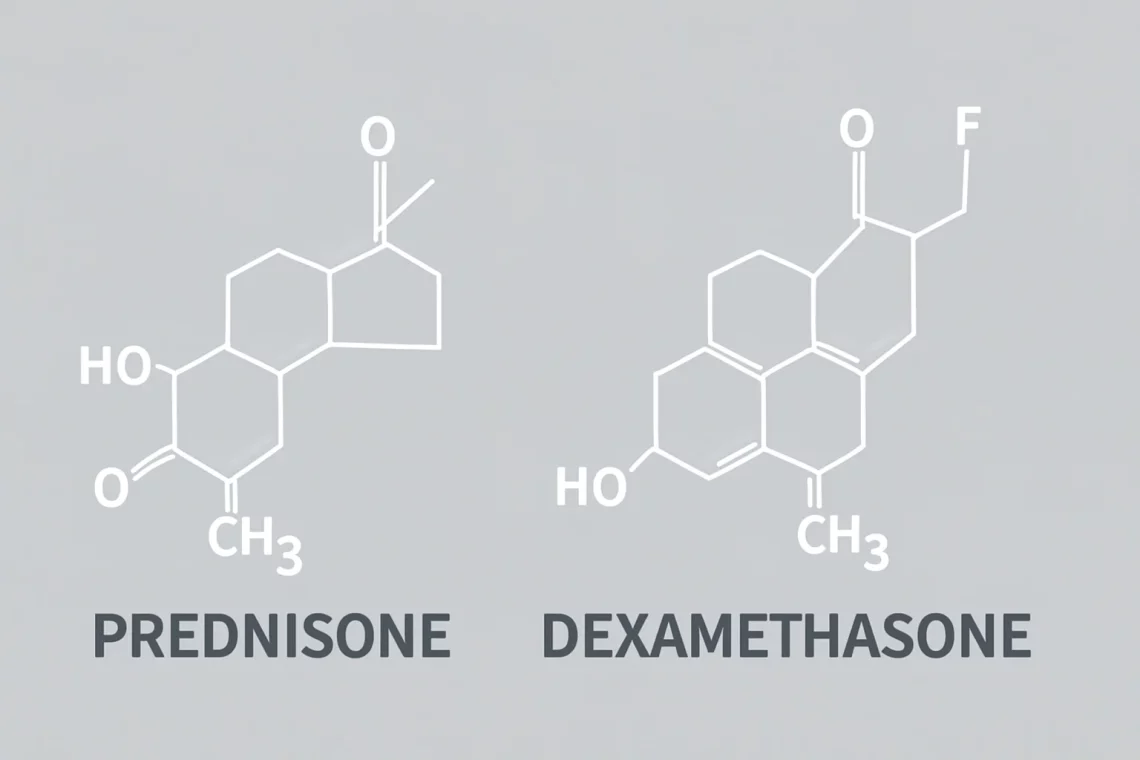
Prednisone vs Dexamethasone: Key Differences and Uses Explained
Prednisone and dexamethasone are two widely used corticosteroids that play significant roles in the treatment of various medical conditions. These synthetic drugs mimic the effects of hormones produced by the adrenal glands, which are essential for regulating metabolism, immune response, and inflammation in the body. While both medications share similarities, they also possess distinct characteristics that influence their use in clinical practice.
Understanding the differences between prednisone and dexamethasone is crucial for healthcare professionals and patients alike. The choice of one over the other can significantly affect treatment outcomes, side effects, and overall patient experience. As corticosteroids, both medications can effectively manage conditions such as allergic reactions, autoimmune diseases, and certain cancers, but their pharmacokinetics, potency, and side effect profiles can vary considerably.
In this article, we will delve into the key differences, uses, and considerations regarding prednisone and dexamethasone, helping to clarify these critical medications and their roles in patient care.
Understanding Prednisone: Uses and Mechanism of Action
Prednisone is a synthetic corticosteroid that is often prescribed to treat a variety of inflammatory and autoimmune conditions. It is particularly effective in managing diseases such as rheumatoid arthritis, lupus, and asthma, among others. The medication works by suppressing the immune response, thereby reducing inflammation and alleviating symptoms associated with these conditions.
When prednisone is administered, it is converted by the liver into its active form, prednisolone. This conversion is essential as prednisolone is the compound that interacts with glucocorticoid receptors in the body, leading to various physiological effects. The anti-inflammatory properties of prednisone are primarily attributed to its ability to inhibit the production of inflammatory cytokines and enzymes, which play a significant role in the inflammatory process.
One of the advantages of prednisone is its relatively lower potency compared to dexamethasone, making it a suitable first-line treatment for many conditions. This lower potency also translates to a different side effect profile. Common side effects of prednisone include weight gain, mood changes, increased appetite, and difficulty sleeping. Long-term use can lead to more severe complications, such as osteoporosis and adrenal suppression, necessitating careful monitoring by healthcare providers.
Dosage and administration of prednisone can vary based on the condition being treated. It is typically given orally in tablet form and can be prescribed as a short-term treatment or for longer durations. Patients are often advised to gradually taper off the medication rather than stopping abruptly to mitigate withdrawal symptoms and prevent potential adrenal crisis.
In summary, prednisone is a versatile corticosteroid that effectively addresses a range of inflammatory and autoimmune disorders. Its mechanism of action, potency, and side effects make it an essential medication in many therapeutic regimens.
Dexamethasone: Potency and Clinical Applications
Dexamethasone is another potent synthetic corticosteroid that is often used in more severe cases or when rapid control of inflammation is required. It is known for its high anti-inflammatory potency, making it a go-to option for conditions such as severe allergies, certain cancers, and critical care situations, including COVID-19 pneumonia.
The mechanism of action for dexamethasone is similar to that of prednisone. It binds to glucocorticoid receptors, resulting in the modulation of gene expression related to inflammation and immune response. However, due to its higher potency, dexamethasone can achieve therapeutic effects at lower doses compared to prednisone. This characteristic can be particularly beneficial in situations where minimizing side effects is a priority.
Dexamethasone is typically administered in various forms, including oral tablets, injectable solutions, and eye drops. In critical care settings, intravenous administration is common for rapid onset of action. Its use in high-dose regimens has gained attention in the treatment of specific cancers and inflammatory conditions, as well as in managing severe COVID-19 cases, where it has been shown to reduce mortality in patients requiring oxygen or mechanical ventilation.
While dexamethasone is effective, it is essential to be aware of its side effects, which can include increased blood sugar levels, mood swings, and potential for adrenal suppression with long-term use. Healthcare providers must weigh the benefits against the risks when prescribing dexamethasone, particularly for extended periods.
In conclusion, dexamethasone is a powerful corticosteroid that offers quick relief for severe inflammatory conditions. Its potency and diverse applications make it a critical tool in the medical field, especially in emergency and oncology settings.
Comparative Side Effects and Considerations
When evaluating prednisone and dexamethasone, understanding their side effect profiles is crucial for both healthcare professionals and patients. While both drugs have overlapping side effects due to their corticosteroid nature, the severity and frequency of these effects can differ significantly.
Prednisone is generally associated with side effects such as weight gain, fluid retention, and increased appetite. Patients may also experience mood changes, insomnia, and gastrointestinal discomfort. More serious long-term effects include osteoporosis, hypertension, and adrenal insufficiency. Because prednisone is often prescribed for more extended periods, patients must be monitored closely for these potential complications.
On the other hand, dexamethasone, while more potent, can lead to a different spectrum of side effects. Due to its ability to raise blood sugar levels, patients with diabetes or those at risk for diabetes need careful monitoring when using dexamethasone. Other common side effects include mood disturbances, increased susceptibility to infections, and gastrointestinal issues.
Another critical consideration is the duration of treatment. Patients on long-term corticosteroid therapy, whether it be prednisone or dexamethasone, may develop a tolerance, requiring higher doses to achieve the same effect. Tapering off the medication is essential to avoid withdrawal symptoms and adrenal crisis.
In addition, drug interactions can play a significant role in the prescribing process. Both medications can interact with other drugs, potentially leading to increased side effects or reduced efficacy. Patients should always provide their healthcare providers with a complete list of medications they are taking to minimize risks.
In summary, while both prednisone and dexamethasone are effective corticosteroids, their side effect profiles and considerations for use can vary. Understanding these differences is vital for optimizing treatment plans and ensuring patient safety.
Conclusion: Choosing Between Prednisone and Dexamethasone
Deciding between prednisone and dexamethasone involves considering multiple factors, including the specific medical condition being treated, the desired speed of treatment response, and the patient’s individual health profile. Each medication has its advantages and disadvantages, which healthcare providers must carefully weigh when developing a treatment plan.
Prednisone is often favored for less severe conditions or long-term management due to its lower potency and more manageable side effect profile. In contrast, dexamethasone is typically reserved for situations that require a more aggressive approach or when rapid symptom control is necessary.
Ultimately, the choice between these two corticosteroids should be guided by clinical judgment, patient history, and monitoring for side effects. Open communication between healthcare providers and patients is crucial to navigate the complexities of corticosteroid therapy.
As always, it is essential to consult with a qualified healthcare professional regarding any medical concerns or treatment options. This article is for informational purposes only and does not constitute medical advice. Always seek the guidance of your physician or other qualified health provider with any questions you may have regarding a medical condition.




